Featured Galleries CLICK HERE to View the Video Presentation of the Opening of the "Holodomor Through the Eyes of Ukrainian Artists" Exhibition in Wash, D.C. Nov-Dec 2021
 USUBC COLLECTION OF OVER 160 UKRAINE HISTORIC NEWS PHOTOGRAPHS 1918-1997
USUBC COLLECTION OF OVER 160 UKRAINE HISTORIC NEWS PHOTOGRAPHS 1918-1997
 "HOLODOMOR 1932-33: THROUGH THE EYES OF UKRAINIAN ARTISTS" - COLLECTION OF POSTERS AND PAINTINGS
"HOLODOMOR 1932-33: THROUGH THE EYES OF UKRAINIAN ARTISTS" - COLLECTION OF POSTERS AND PAINTINGS
 USUBC COLLECTION OF HISTORIC PHOTOGRAPHS ABOUT LIFE AND CAREER OF IGOR SIKORSKY PHOTOGRAPHS - INVENTOR OF THE HELICOPTER
USUBC COLLECTION OF HISTORIC PHOTOGRAPHS ABOUT LIFE AND CAREER OF IGOR SIKORSKY PHOTOGRAPHS - INVENTOR OF THE HELICOPTER
 Ten USUBC Historic Full Page Ads in the Kyiv Post
Ten USUBC Historic Full Page Ads in the Kyiv Post

Andriy Yermak: ‘US support of Ukraine must go to next level’
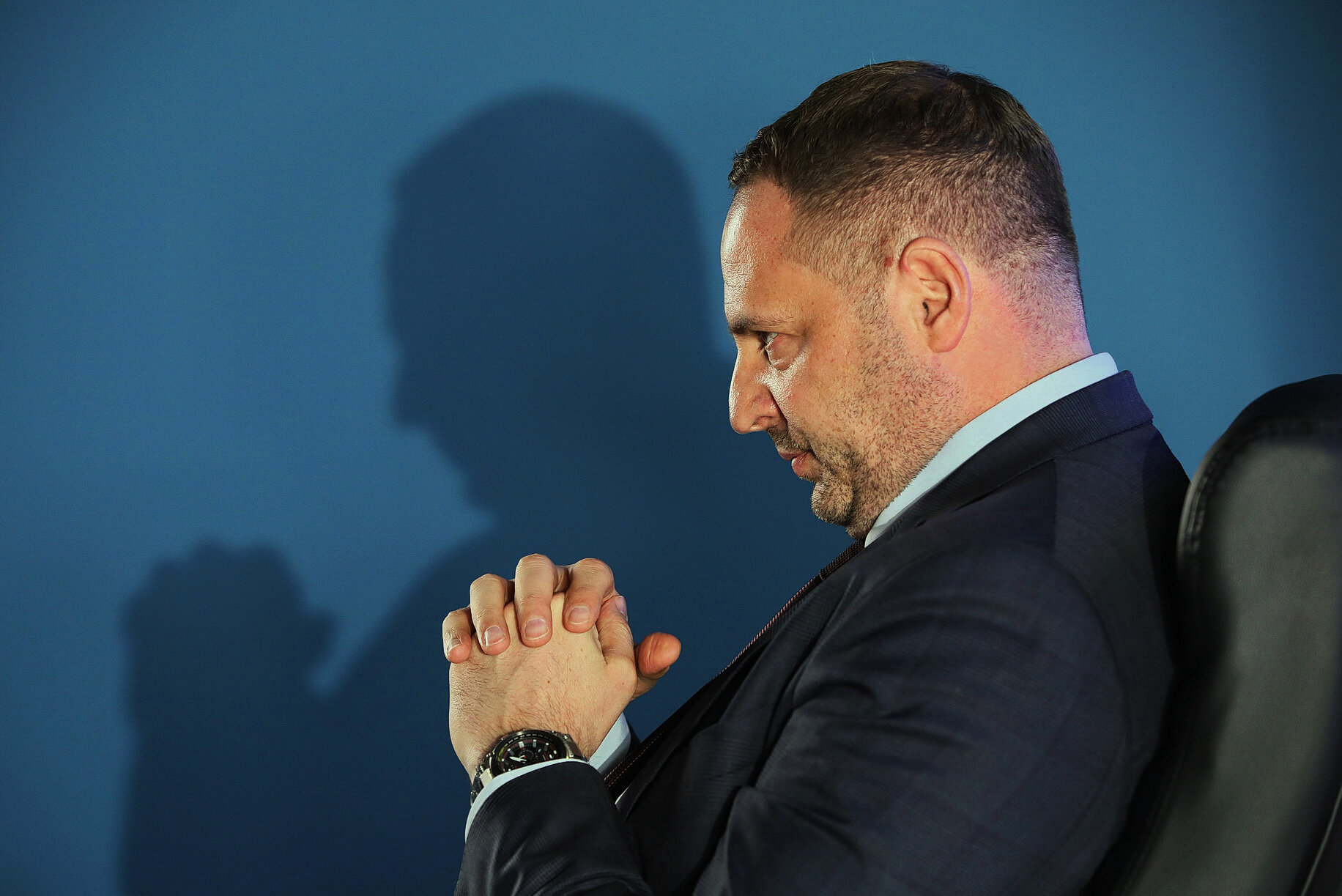 By Olga Rudenko, Kyiv Post,
By Olga Rudenko, Kyiv Post,
Kyiv, Ukraine, Thu, Feb 25, 2021
Andriy Yermak influences most decisions in Ukraine, yet Ukraine knows remarkably little about him.
As President Volodymyr Zelensky’s chief of staff, Yermak is the second most powerful official in the country — although some would argue that Interior Minister Arsen Avakov holds that prize. And yet, Yermak wasn’t elected by the people or confirmed by parliament.
His vast responsibilities and rare public appearances earned him a somewhat sinister reputation in the media as a power-greedy and machiavellian politician.
Yermak says this image is an unwanted inheritance he got from the chiefs of staff to previous presidents, and seeks to disperse it.
“Rumors about (my powers) are exaggerated,” he says, repurposing a famous quote by Mark Twain.
But as the Kyiv Post spoke with Yermak at the presidential office on Feb. 19, it was beginning to appear that the exaggeration wasn’t that big after all.
Yermak oversees peace talks with Russia, communications with Western partners, regional policy and the office’s coordination with the Cabinet of Ministers and parliament. He has to know everything, he says, in order to best serve Zelensky.
Right now, he is preoccupied with the country’s relations with the new U.S. administration. Ukraine wants its most powerful partner to play a key role in the peace process in the Donbas, where Russia’s war against Ukraine has killed over 13,000 people since 2014.
“I believe that the U.S. support of Ukraine must go to the next level,” Yermak says.
‘Adventure film’
If he never met Zelensky, Yermak, 49, would likely have spent the last year producing yet another movie and pitching it to film festivals. Instead, he spent it running Zelensky’s presidential administration and negotiating for peace in the Donbas.
“My life is like an adventure film right now,” says the former copyright lawyer and producer, adding that he is forever thankful to Zelensky for that.
His loyalty to Zelensky is perhaps Yermak’s most defining feature. He praises the president at every opportunity, especially the president’s “integrity and honesty.” The two are longtime friends.
Although Yermak is an accidental arrival to Ukraine’s politics, he tries to play the part.
Unlike his volatile predecessor Andriy Bohdan, Yermak makes an effort to be diplomatic and restrained. It could explain why, unlike Bohdan, he already lasted more than a year, and appears to be in harmony with his boss.
Notably, when Yermak’s brother was implicated in selling government posts — something that both brothers deny and call a political attack — the president immediately supported Yermak.
The tapes implicating Yermak’s brother are still being investigated. Yermak testified in the case.
In his turn, Yermak says he “trusts Zelensky unconditionally” and would agree to serve as his chief of staff again if the president went for a second term.
He says the president’s work is underappreciated, especially in the Ukrainian media, and recalls how well Zelensky is received abroad — for example, during his recent visits to the United Arab Emirates and the U.K.
“In the UAE, it was called a historical visit,” Yermak says. “I’d like to see a time when Ukrainian media don’t shy away from such praise.”
The UAE has no free media, according to freedom of press ratings. Yermak notes that he and Zelensky both recognize the importance of press freedoms and welcome criticism when it’s constructive.
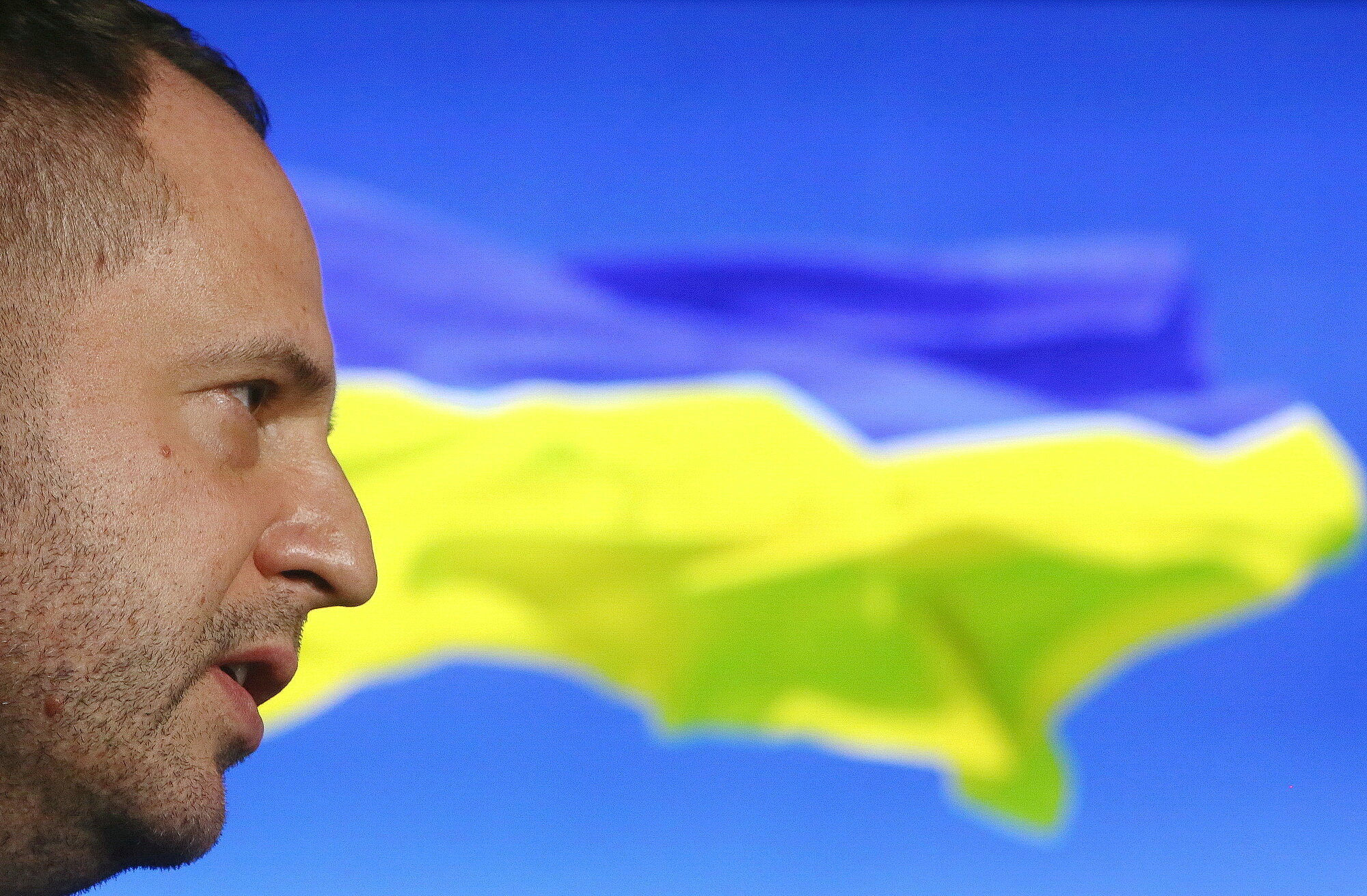
Andriy Yermak, President Volodymyr Zelensky’s chief of staff, talks to the Kyiv Post on Feb. 19 at the President’s Office in Kyiv.
Photo by Pavlo Podufalov
Focus on US
One of Zelensky’s administration’s top priorities is building a relationship with the new U.S. administration of President Joe Biden.
Ukrainian media have focused a lot of attention on the fact that Biden didn’t yet have a phone call with Zelensky, speculating about what conditions Washington could be setting for the call to happen.
Yermak says that such reports are groundless.
“Barely a month has passed since Biden’s inauguration, and he only had a handful of calls,” says Yermak. “There are no complications and the call will take place when it’s convenient for both presidents. I believe that it will be in the nearest future.”
A visit is also very possible, according to Yermak. The last time a sitting U.S. president visited Ukraine, it was George W. Bush in 2008. Many hope that Biden, who visited Ukraine many times as vice president to Barack Obama, will return as president.
“I hope we can arrange the visit this year,” says Yermak. “We hope that President Biden will come for our 30th anniversary of independence.”
So far, Ukraine has been satisfied with Biden’s early signals.
“President Biden voiced his support for Ukraine in his public speeches and in the call with Putin. We feel this support,” says Yermak. “It’s important that Ukraine too contributes to this relationship and becomes a really interesting partner, one that will attract U.S. investments.”
But Ukraine wants to take the relationship to the next level.
“I want Ukraine to be perceived as one of the top strategic partners (of the U.S.),” Yermak says. “Right now it’s not perceived as such.”

Andriy Yermak, President Volodymyr Zelensky’s chief of staff, talks to the Kyiv Post on Feb. 19, 2021 at the President’s Office in Kyiv. (Volodymyr Petrov)
Ukraine has made it clear that it wants the U.S. to help bring peace to the Donbas, where Russia has been waging a proxy war against Ukraine since 2014.
While the U.S. isn’t sitting on the sidelines, having sanctioned Russian nationals and Russia’s Nord Stream 2 project, and given Ukraine financial and military aid, the country is not part of the peace negotiations. Since 2014, the negotiations have been taking place in the so-called Normandy Format — with the leaders of Ukraine, Russia, Germany, and France participating — and within a trilateral group meeting in Minsk.
The negotiations saw small breakthroughs with the Normandy leaders meeting in December 2019 and achieving a shaky ceasefire in 2020, but have largely stalled since.
“The U.S. can play a key role in ending the conflict in the Donbas,” Yermak says.
“We count on the U.S. support to help us become a NATO member. The decision is taken collectively but if the U.S. supports Ukraine’s candidacy and its readiness to join NATO, it will be a very strong signal.”
When asked what the administration’s goal is for the Donbas in 2021, Yermak answers simply:
“To end the war.”
‘Ukraine fatigue’ over
The U.S. has been the main force blocking the construction of Nord Stream 2, a pipeline that would bring gas from Russia to Germany bypassing Ukraine. The construction stopped due to U.S. sanctions.
By contrast, German officials often defend the project.
“Of course, we are following these statements,” he says. “We react to them through diplomatic channels and during meetings. But it’s the position of several officials — not the same as the position of a country.”
In general, Yermak says the support of Ukraine’s European partners isn’t faltering, including within the Normandy format talks.
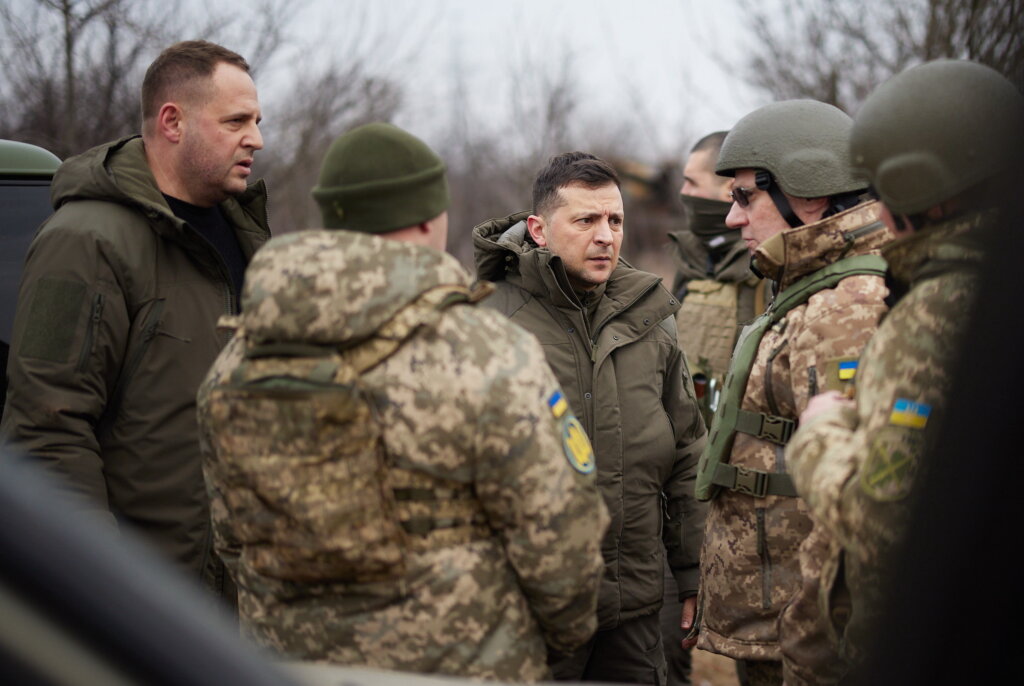
President Volodymyr Zelensky (C) and his chief of staff Andriy Yermak (L) inspect Ukrainian combat lines during a visit to the war zone of the Donbas on Feb. 11, 2021. (Presidential press service )
“I can’t say that the world is forgetting about the war in Ukraine. We are working relentlessly to not let it forget, and to make sure that everyone understands — Europe won’t be safe until the war in Ukraine stops.”
US impeachment
There is a complicated background to Yermak’s, and Zelensky’s, relationship with the new U.S. administration.
When an impeachment trial in 2019 exposed President Donald Trump and his associates’ efforts to pressure Zelensky into investigating Ukrainian company Burisma, which employed Joseph Biden’s son, they also exposed Yermak’s prominent role in the communication.
According to Kurt Volker, then a special envoy to Ukraine, Yermak told him that Zelensky would make the statement about Burisma.
He also apparently agreed to run the statement by Volker first — but said that Zelensky would deliver it only after the White House confirmed the date for his visit.
The promised statement never happened. During the negotiation, Trump held up U.S. military aid to Ukraine and made the infamous phone call to pressure Zelensky into investigating Biden. The transcript of the call led to Trump’s first impeachment.
Yermak isn’t keen on letting out any more details about those days. Moreover, he challenges the idea that the released text messages belong to him.
“I never authorized the publication of any messages that may or may not be mine,” he says. “So it’s hard to say they’re authentic. Some things that I saw in U.S. media weren’t true. I remember everything I said. I have a good memory and so does my phone.”
He said that he reached out to Giuliani and asked to talk to him because he saw Giuliani making public comments about Zelensky being “surrounded by enemies of America.”
“I didn’t know that he was Trump’s lawyer,” Yermak says. “I only knew him as a former mayor of New York.”
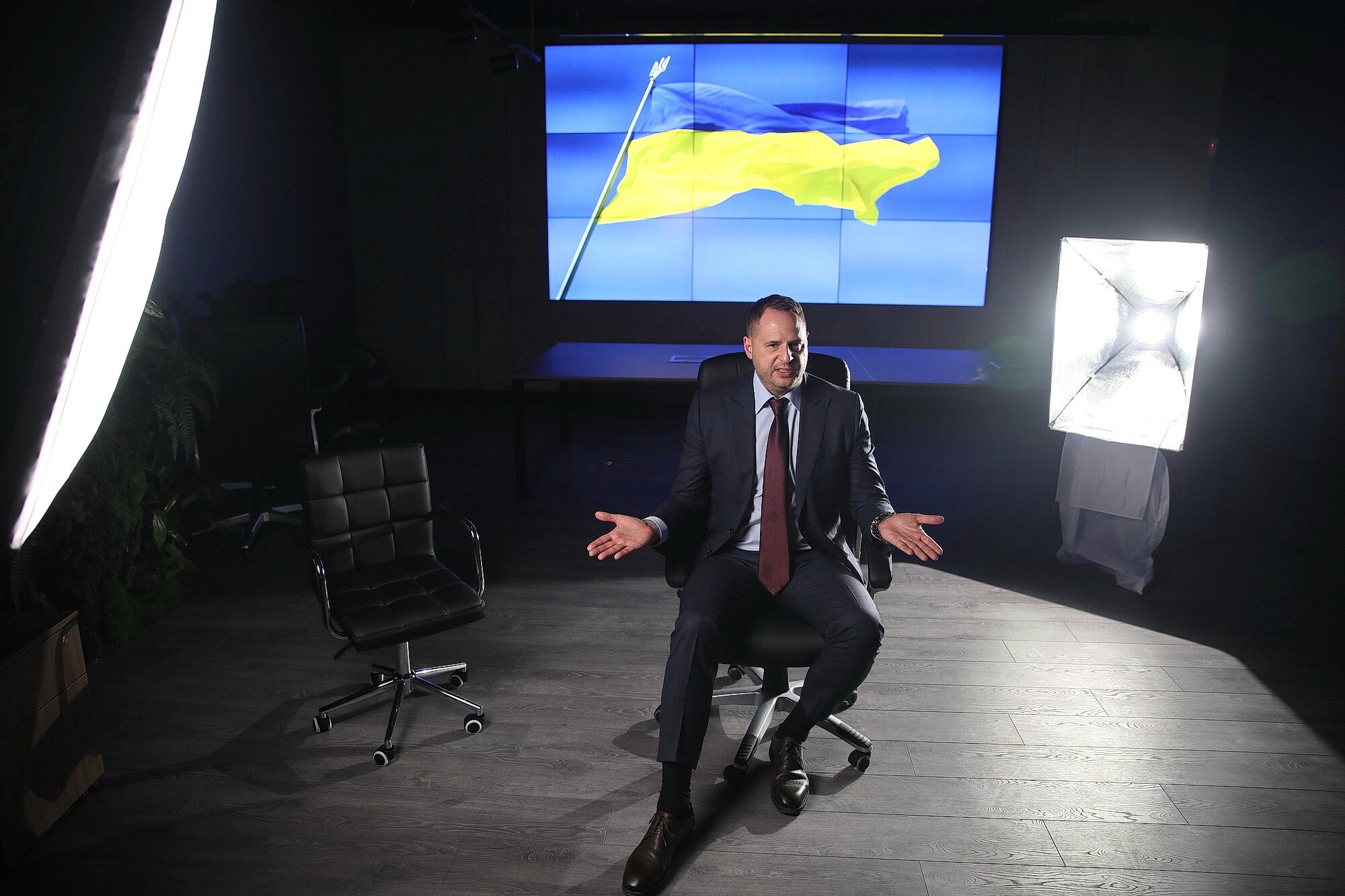
Andriy Yermak, President Volodymyr Zelensky’s chief of staff, talks to the Kyiv Post on Feb. 19 at the President’s Office in Kyiv.
Photo by Volodymyr Petrov
At this time, Giuliani was widely known as Trump’s lawyer and supporter, and was the subject of articles like The New Yorker’s “How Rudy Giuliani Turned Into Trump’s Clown.”
When Giuliani first brought up Burisma, Yermak says it was a surprise to him. He didn’t know anything about the case.
“I think it was obvious from my reaction that there was no point in talking to me about this (Burisma case),” he says.
That’s not how Giuliani saw it. In 2019, he told the New York Times he came away from his interactions with Yermak “pretty confident they’re going to investigate it.”
“I don’t know what was the goal of Mr. Giuliani and others I talked to,” Yermak says.
“It was a complicated time,” he continues. “But the president demonstrated a strong position based on integrity. Ukraine and Zelensky showed that we won’t interfere in other countries’ domestic affairs — and won’t let others interfere in ours.”
Even now, Yermak carefully refuses to denounce Trump’s actions towards Ukraine as unethical.
“It wouldn’t be right for me to evaluate the actions of even the former president of the U.S.” he says. “But we still think it was wrong for the American side to publish the transcript of the phone call (between Zelensky and Trump) without our authorization.”
Likewise, it’s wrong, he says, that some recordings of conversations of then-President Petro Poroshenko and then-U.S. Vice President Biden were leaked and published in Ukraine.
The edited recordings were published by lawmaker Andriy Derkach, whom the U.S. considers an “active Russian agent,” in May 2020.
Back then, it got an ambiguous response from Zelensky, who said that “it can be qualified as treason” while not being clear whether he meant Poroshenko’s behavior during conversations or the fact they were published by Derkach.
Now, with Biden in the White House, Yermak unequivocally denounces the publication of the Biden-Poroshenko phone calls and says the leak is being investigated.
There is also another phone call in the picture.
Now, as the Ukrainian administration is building its relationship with Biden’s, Zelensky’s former employee suddenly opened up to the U.S. media about additional details of Trump’s entourage’s campaign of pressure.
Ihor Novikov, ex-advisor to Zelensky, talked to Time magazine about a phone call between Trump’s lawyer Giuliani, who spearheaded the pressure campaign, on the one side, and Yermak and Novikov on the other.
The call, according to Novikov, left him and Yermak in disbelief about what was asked of them. It happened shortly before Trump called Zelensky.
Novikov told Time that he was ready to testify against Giuliani in the U.S.
Yermak won’t be joining him.
“I’m a sitting official and it would be strange if I was invited to testify in this case,” Yermak said. “I think that participation of any foreign citizen in an investigation in the U.S. can be seen as interference in domestic affairs.”
Will Ukraine investigate the actions of Giuliani or others within the pressure campaign in Ukraine?
“It’s up to our law enforcement agencies,” says Yermak. “If the SBU finds any signs of a crime, they will look into that. I won’t interfere.”
Boundaries with West
The week before Yermak’s interview with the Kyiv Post was dominated by discouraging news: The mission of the International Monetary Fund concluded that Ukraine needs to “show more progress” before the fund disburses another installment within an existing stand-by agreement. The $700 million tranche has been postponed for months.
The IMF mission’s statement specifically named the areas it focused on: strengthening the governance of the National Bank; improvements to the framework for bank supervision and resolution; policies to reduce the medium-term fiscal deficit; legislation restoring and strengthening the anti-corruption framework and the judiciary; and energy policy.
Yermak doesn’t hide that the Ukrainian side wasn’t happy with the statement. Without going into details, he says there was a misunderstanding.
“There was a small unfortunate mishap with the IMF statement,” Yermak says. “The negotiations went into the night and both sides agreed on the conclusions. Then, in the morning, this statement was released and it wasn’t done in the way that reflected what was agreed upon.”
Yermak’s adviser Tymofiy Mylovanov went further, denouncing the IMF’s actions during the negotiations and alleging that the fund wanted too much control over Ukraine. It’s a narrative favored by pro-Kremlin politicians in Ukraine: The West taking control of Ukraine in return for loans.
Still, Yermak pointed out that Ukraine’s cooperation with IMF continues and Mylovanov’s comments don’t reflect the position of the administration.
“Any rumors of any rift with the IMF are grossly exaggerated,” he said.
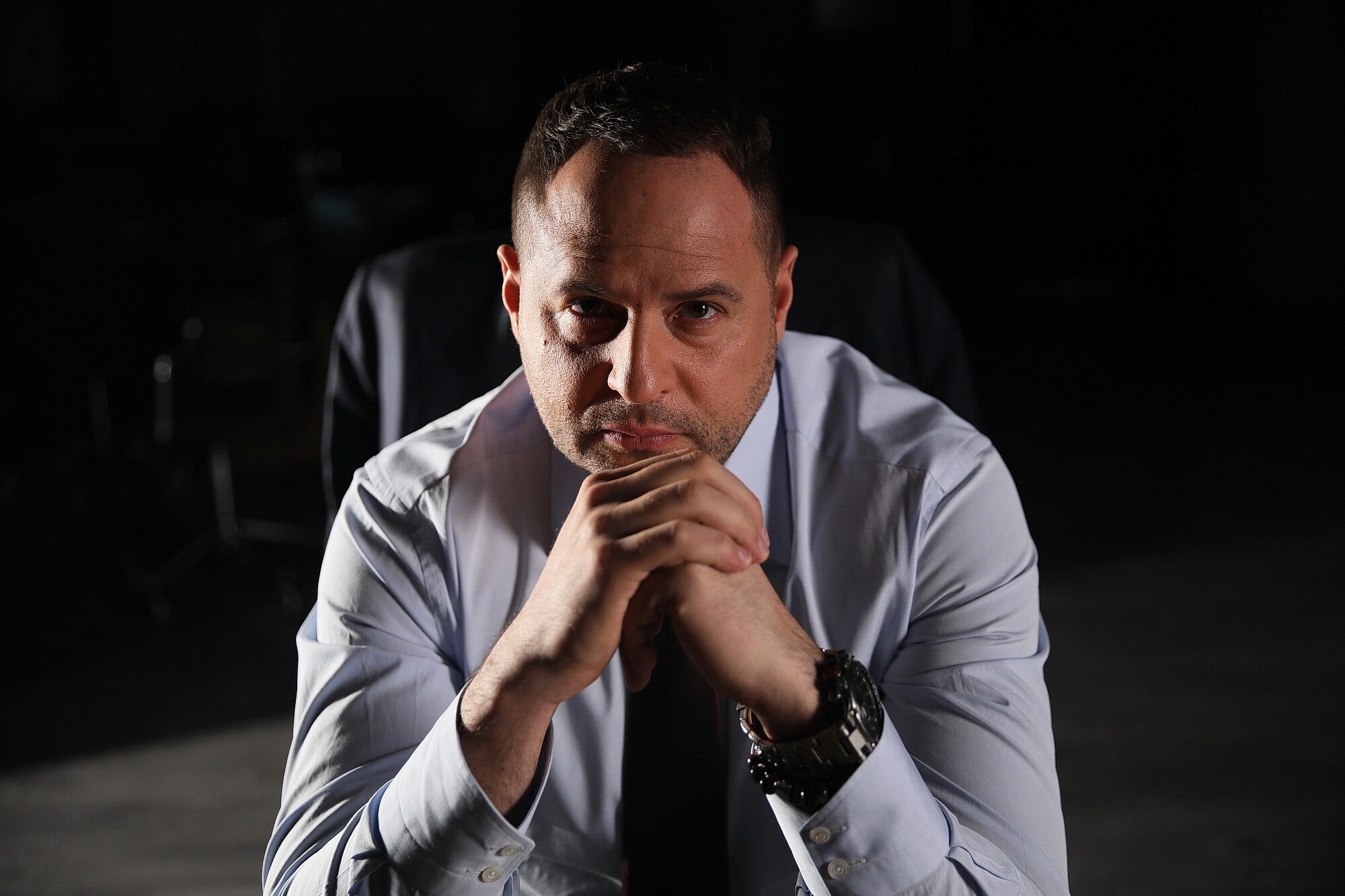
Andriy Yermak, President Volodymyr Zelensky’s chief of staff, poses for a photo after the interview on Feb. 19 at the President’s Office in Kyiv.
Photo by Volodymyr Petrov
This small rebuke captures the mood of the administration, which is eager to confront Western partners when it thinks they overreach.
It finds reflection in other comments, too. Commenting on the G7 ambassadors’ proposed roadmap for judicial and anti-corruption reforms, Yermak’s deputy Andriy Smyrnov told news website Zakon i Biznes that the administration appreciates advice but warned that advice should come “without deadlines or coercion.”
It’s a recurring topic for Yermak as well. While he assures of Ukraine’s great relationship with the West, he says that it must be a relationship of equals.
“It’s very important for our — independent — state,” says Yermak, emphasizing the word, “that today we are treated with respect. It’s very important that we work as partners. The way we work in this administration is that no one forces us to do anything, and we don’t beg for anything.”
This wasn’t the case with the administration of ex-President Petro Poroshenko, when reforms were “a condition” set by the West, he suggests.
“But we came here already wanting to reform the country. We don’t need to be persuaded to do so.”
To back up his words, Yermak added that a judicial reform roadmap will be presented in late February — and it will reflect the G7 ambassadors’ recommendations.
NABU
Another sign of the administration’s readiness to confront — or at least raise the eyebrows of the West — is the latest effort to fire Artem Sytnyk, head of the National Anti-Corruption Bureau.
Sytnyk, who has had the strong support of Ukraine’s Western partners as a guarantor of NABU’s independence, survived several attempts to fire him. The latest attempt comes in the form of the bill reforming NABU proposed by the Cabinet of Ministers on Feb. 15. Among other things, it seeks to fire Sytnyk.
This latest effort to get rid of Sytnyk may succeed — especially since it appears to be backed by the president. The Kyiv Post sources at the NABU who weren’t authorized to speak to the press said that days before the bill was submitted, Zelensky called Sytnyk and lashed out at him over an investigation into the government’s procurement of COVID-19 vaccines.
While carefully refusing to endorse the firing of Sytnyk (“It’s up to the parliament”), Yermak notes that the investigation was indeed concerning.
“I don’t want to judge the actions of NABU but I think that any actions that can impede the receiving of the vaccine by Ukraine are strange and untimely,” he said.
“But if the NABU has any facts of violations, they should be investigated,” he adds. “There are no untouchables.”
The NABU opened the investigation after a complaint by an official in charge of procurement. It accused Health Minister Maksym Stepanov of ordering the procurement to go through a specific intermediary company, which allegedly raised the price of the purchase.
This purchase is for only 1.8 million doses of the vaccine. Later, Ukraine ordered more vaccines from other sellers and will receive some for free as part of the Covax program. The vaccination began on Feb. 24.
Controversial officials
The vaccine investigation may have been the last drop, but the alienation of Sytnyk and Zelensky’s office goes back to another recent case.
The NABU has been investigating one of Yermak’s deputies, Oleh Tatarov, in a bribery case.
Tatarov is suspected of bribing an expert to get a false evaluation on behalf of a construction company he worked for, Ukrbud. The evaluation was a crucial element of an alleged large-scale embezzlement scheme.
Yermak said this has not been proved and the alleged bribery took place before Tatarov took his post in Zelensky’s administration.
“As the head of administration I need to make sure that every employee knows that they won’t be protected if they are guilty of corruption. But at the same time I will guarantee there is an independent investigation of any such case,” he says.
“If there is a court sentence (against Tatarov), we will immediately take measures.”
However, the administration has been accused of protecting Tatarov through Zelensky’s appointee, Prosecutor General Iryna Venediktova. Venediktova has changed prosecutors in the case, delaying charges against Tatarov.
Venediktova has been under constant criticism by anti-corruption activists over her alleged attempts to derail or delay prosecution in a number of high-profile cases, such as the PrivatBank embezzlement, coal pricing scheme Rotterdam+, or a bribery case against a lawmaker from Zelensky’s party.
Yermak, however, says he trusts in the prosecutor general’s integrity.
“I know her personally, and I don’t believe any allegation (of her corruption),” he says. “She is a professional and a patriot. I think that she will demonstrate results in high-profile cases in the future and it will completely end any existing mistrust in her.”
























